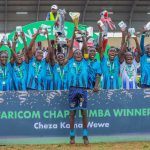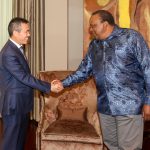The Executive Board (EB) of the International Olympic Committee (IOC) has decided that Individual Neutral Athletes (AINs) who have qualified through the existing qualification systems of the International Federations (IFs) on the field of play will be declared eligible to compete at the Olympic Games Paris 2024 in accordance with the the conditions outlined below.
Individual Neutral Athletes are athletes with a Russian or Belarusian passport. The strict eligibility conditions based on the recommendations issued by the IOC EB on 28 March 2023 for International Federations and international sports event organisers will be applied.
LIKE ALL OTHER ATHLETES Like all the other athletes at the Olympic Games, the Individual Neutral Athletes will also have to comply with the rules and regulations applicable at the Olympic Games, including anti-doping.
Like all the other athletes, they will also have to sign the updated Conditions of Participation applicable for Paris 2024. This contains a commitment to respect the Olympic Charter, including “the peace mission of the Olympic Movement”. Please find an excerpt of the new form here.
The Individual Neutral Athletes will be invited by the IOC and their respective IFs. Only a very limited number of athletes will qualify through the existing qualification systems of the IFs. Among the 4,600 athletes from around the world who have qualified for Paris 2024 so far, there are only 11 Individual Neutral Athletes (eight with a Russian passport plus three with a Belarusian passport). In comparison, to date more than 60 Ukrainian athletes have qualified for Paris 2024. It is expected that the Ukrainian delegation is going to be around the same size as at the Olympic Games Tokyo 2020.
STRICT ELIGIBILITY CONDITIONS The strict eligibility conditions for Individual Neutral Athletes at Paris 2024 are the very same strict eligibility conditions under which they qualified, namely:
1. Qualified athletes with a Russian or Belarusian passport will be entered as, and compete as, Individual Neutral Athletes (“AINs”).
2. Teams of athletes with a Russian or Belarusian passport will not be considered.
3. Athletes who actively support the war will not be eligible to be entered or to compete. Support personnel who actively support the war will not be entered.
4. Athletes who are contracted to the Russian or Belarusian military or national security agencies will not be eligible to be entered or to compete. Support personnel who are contracted to the Russian or Belarusian military or national security agencies will not be entered.
5. Any such Individual Neutral Athlete, like all the other participating athletes, will have to meet all anti-doping requirements applicable to them in the lead-up to and at the Olympic Games Paris 2024, and particularly those set out in the anti-doping rules of the IFs.
6. The sanctions against those responsible for the war, the Russian and Belarusian states and governments, remain in place for the Olympic Games Paris 2024. This means, in particular, that:
a. No flag, anthem, colours or any other identifications whatsoever of Russia or Belarus will be displayed at the Olympic Games Paris 2024 in any official venue or any official function.
b. No Russian or Belarusian government or state officials will be invited to or accredited for the Olympic Games Paris 2024.
INDEPENDENT EVALUATION The practical application of today’s IOC EB decision can be found in the “Principles Relating to the Implementation of the Participation for Individual Neutral Athletes and their Support Personnel with a Russian or Belarusian Passport at the Olympic Games Paris 2024”, which is a separate document and can be found here. It says amongst other things that the IOC will seek an independent evaluation of the eligibility of each qualified AIN proposed by the IF, and their support personnel.
The considerations of the IOC EB included, amongst others:
1. The call by the International Federations at the Olympic Summit on 5 December 2023 to take such a decision as soon as possible. The call by the IFs was supported by the Association of National Olympic Committees (ANOC), the Continental Associations of National Olympic Committees (NOCs) and the NOCs present.
2. The view of the overwhelming majority of athletes not to punish fellow athletes for the actions of their government.
3. The fact that all these calls and views were reaffirmed and further strengthened in consultation calls with the stakeholders of the Olympic Movement this week: the IOC Members, the network of athlete representatives, the International Federations and the National Olympic Committees.
4. Olympic Truce Resolution A/RES/78/10 by the United Nations (UN) for the Olympic and Paralympic Games Paris 2024, which supports the autonomy of sport and the political neutrality of the IOC, as enshrined in the Olympic Charter. It was approved by an overwhelming majority of 118 Member States, with only two countries abstaining (the Russian Federation and the Syrian Arabic Republic) and no votes against.
5. The G20 New Delhi Leaders’ Declaration, which said in September: “We also look forward to the Paris Olympic and Paralympic Games in 2024 as a symbol of peace, dialogue amongst nations and inclusivity, with participation of all.”
6. The declaration by the Non-Aligned Movement, comprising 120 UN Member States, which said: “The participation of athletes from all 206 National Olympic Committees in Paris 2024 Olympic and Paralympic Games would be a strong symbol of unity of humanity.” (Please find more information here)
7. The concerns of two Special Rapporteurs from the UN Human Rights Council, requesting that the IOC ensure the “non-discrimination of any athlete on the basis of their nationality”.
8. The reassurances at the Olympic Summit by the President of the World Anti-Doping Agency (WADA) and the Chair of the International Testing Agency (ITA) that doping controls in Russia continue. This year, more than 10,500 samples from Russian athletes in and out of competition have been collected despite the extremely limited number of AINs taking part in international competitions. This means that Russia remains among the top-ten nations being tested. In addition, it was indicated that the ITA had conducted well over 400 out-of-competition tests on athletes with Russian nationality in 2023. Both blood and urine samples are transported with a strict chain of custody to multiple laboratories outside the country. Any adverse analytical findings are actioned and monitored by WADA.
9. The fact that the ITA’s intelligence-led Pre-Games Testing Anti-Doping Programme, which targets athletes, sports and countries with the highest risks and athletes who are likely to qualify for Paris 2024, includes Russian athletes.
DESPITE SUSPENSION OF ROC Despite the suspension of the Russian Olympic Committee (ROC), the IOC EB did not change its recommendations concerning the participation of AINs under these strict conditions. The protection of the rights of individual athletes to participate in competitions despite the suspension of their NOC is a well-established practice, respecting human rights, and has been implemented across a number of suspended NOCs during past Olympic Games. The ROC had to be suspended because of its unilateral decision to include as its members the regional sports organisations under the authority of the NOC of Ukraine, which is a breach of the Olympic Charter because it violates the territorial integrity of the NOC of Ukraine.
COMMITMENT TO HELP UKRAINIAN ATHLETES The IOC EB also reaffirmed again the steadfast commitment of the entire Olympic Movement to help Ukrainian athletes in every way possible, in order to see a strong team from the National Olympic Committee of Ukraine at the Olympic Games Paris 2024 and the Olympic Winter Games Milano Cortina 2026. In order to achieve this, the IOC has tripled its Solidarity Fund for the NOC of Ukraine to USD 7.5 million.
At least 3,000 Ukrainian athletes and other members of the Olympic community of Ukraine have benefitted from the IOC Solidarity Fund through the NOC of Ukraine over the past 12 months, and from direct assistance from other Olympic Movement stakeholders, including the IFs and the NOCs. These efforts have taken the form of financial and logistical support, in order to ensure that Ukrainian athletes can continue to train and take part in competitions by providing travel support, training facilities, accommodation, equipment and uniforms, amongst other items.





